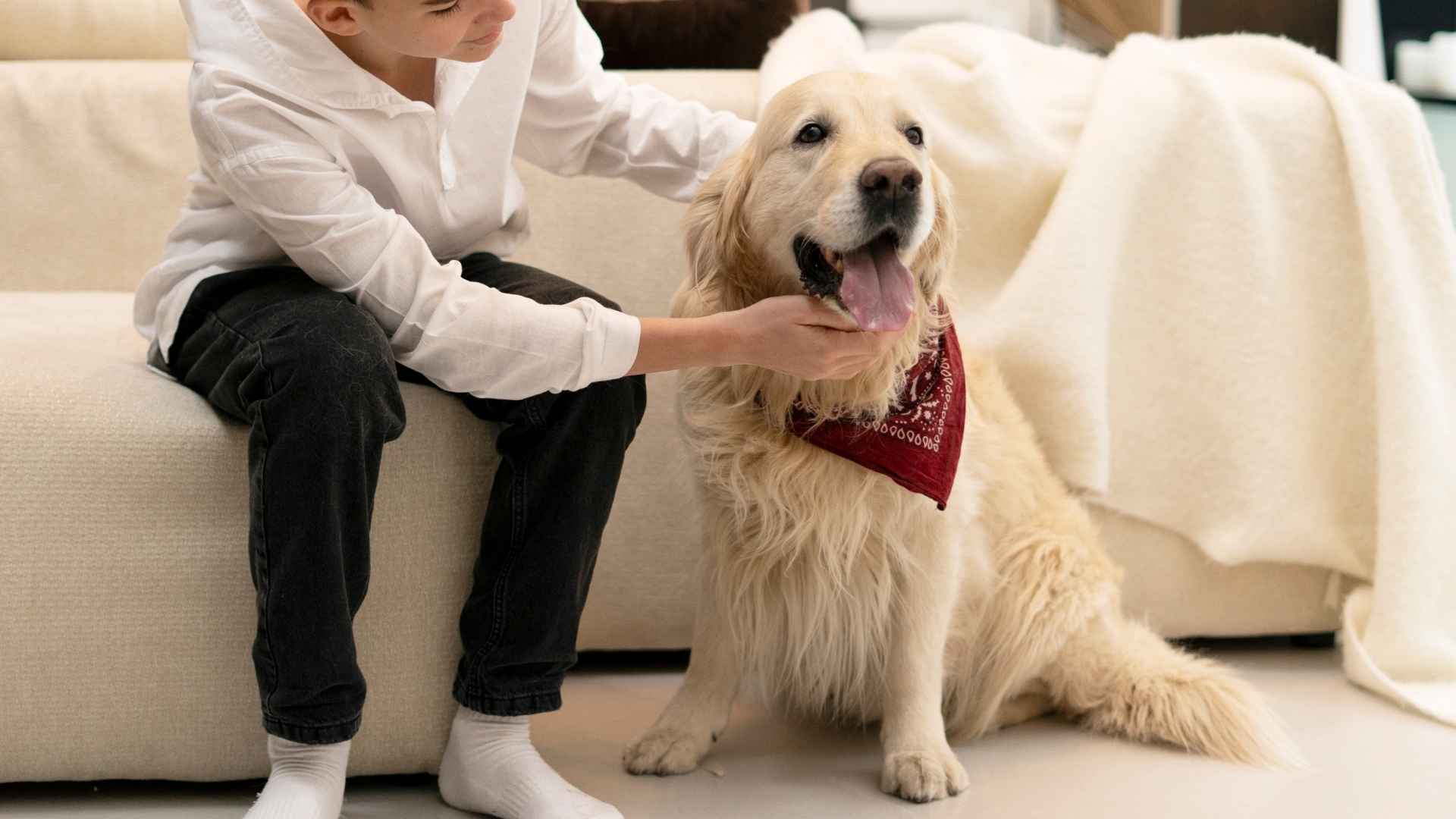When you think of emotional support dogs, calm and gentle may come to mind, but not all ESAs are couch cuddlers. Some emotional support animals are full of life, thriving on activity and engagement. Hyperactive emotional support dog breeds bring a unique blend of high energy and emotional comfort, making them ideal companions for people who benefit from both constant movement and loyal companionship.
Unlike service dogs, ESA dogs don’t require special training or registration, but they play an equally vital role in supporting mental well-being. These energetic pups may not be allowed in restaurants or malls, but they’re allowed to live with their owners, even where pets aren’t typically welcome.
Dogs, in general, are popular ESAs due to their affectionate nature and responsiveness, but certain breeds stand out for their high energy levels. If you’re someone who needs emotional grounding and a partner to match your active lifestyle, these hyperactive ESA breeds might be perfect for you.
Hyperactive Emotional Support Dog Breeds
1. American Staffordshire Terrier

The American Staffordshire Terrier, often called the AmStaff, is a confident, intelligent breed originally developed in the United States. First recognized by the AKC in 1936 as the Staffordshire Terrier, it shares its roots with the British Staffordshire Bull Terrier.
Known for their strength and loyalty, AmStaffs are also incredibly friendly when properly socialized, making them not only great pets but also devoted companions.
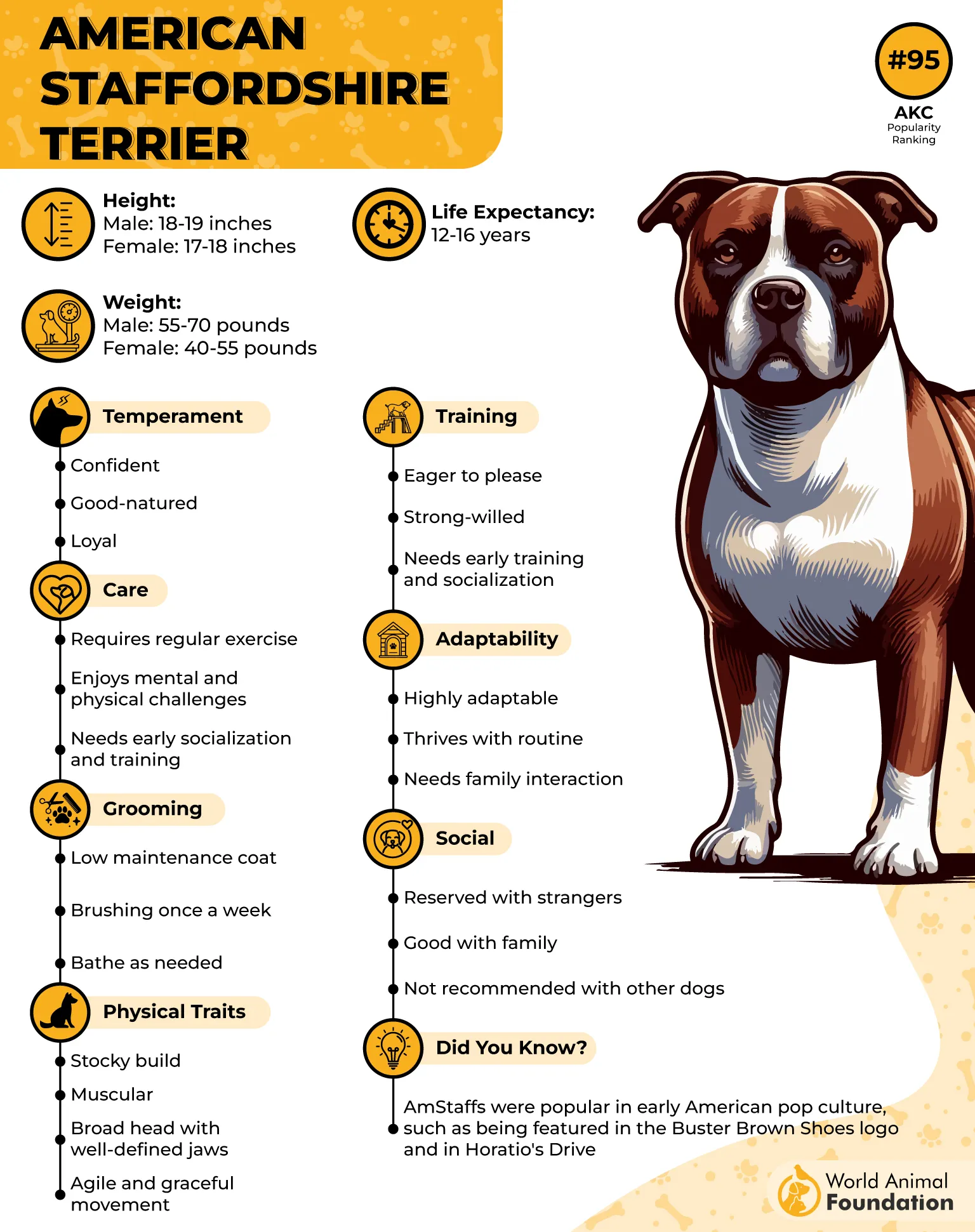
This breed is bursting with energy and thrives on physical activity. Daily walks, energetic play sessions, and mentally stimulating games like obedience training or agility courses are a must. Daily exercise not only keeps them fit but also helps prevent boredom and behavioral issues. An active AmStaff is a happy AmStaff!
With the right training and positive reinforcement, American Staffordshire Terriers can make exceptional therapy dogs. Their affectionate nature and comforting presence make them ideal for settings like clinics, schools, and care homes. They often connect easily with patients dealing with autism, mobility challenges, or emotional difficulties, helping them feel safe, calm, and more willing to engage.
Therapy AmStaffs have a unique way of reaching people. Their presence encourages emotional expression, reduces anxiety, and builds self-confidence.
Patients often feel understood and accepted, which can be incredibly healing. Through gentle interaction and consistent affection, AmStaffs helps people come out of their shells and reconnect with the world around them.
2. Golden Retriever
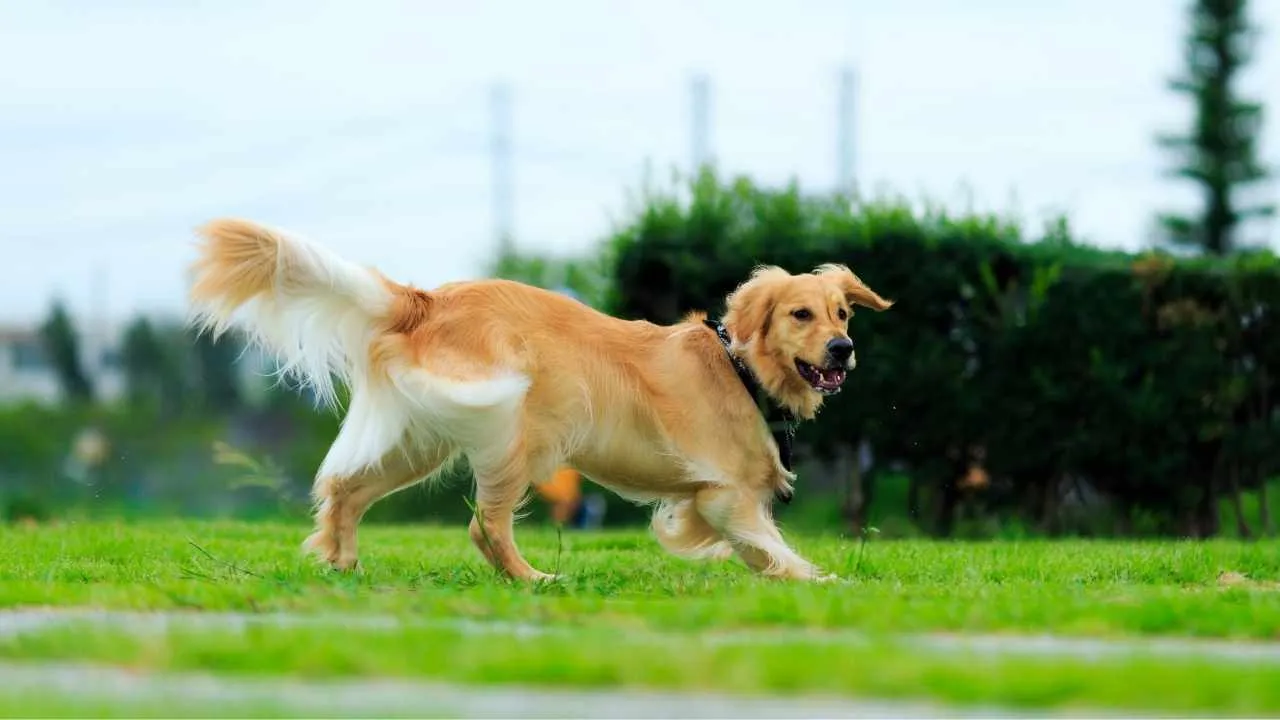
The Golden Retriever might just be the prom king of the dog world—friendly, smart, lovable, and instantly recognizable. Bred for generations to be at our side, Goldens are the ultimate companions.
Their eager-to-please nature and warm temperament make them one of the most popular choices for emotional support animals. They’re gentle, patient, and intuitive— personality traits that make them especially comforting in times of distress.

Golden Retrievers have long been at the frontlines of emotional healing. From offering comfort to survivors of natural disasters to helping victims testify in courtrooms, these dogs have a unique ability to bring calm in the midst of chaos. Their emotional intelligence makes them highly effective support animals for people of all ages and backgrounds, states ESA.
For individuals living with PTSD, depression, or trauma, a Golden Retriever can offer both emotional reassurance and a sense of physical safety. Their substantial size—ranging from 55 to 95 pounds—can be grounding for someone dealing with anxiety or panic attacks, especially at night.
Children with an autism spectrum disorder or those recovering from trauma also tend to respond well to the gentle nature, accepting the warm presence of a Golden, who often acts like a protective, non-judgmental friend.
These dogs are not just emotionally tuned in—they’re also full of energy. Goldens need at least two hours of exercise daily, including walks, playtime, and mentally stimulating activities. Games like fetch are not only fun but also satisfying for them since retrieving is in their DNA. If under-stimulated, they can get bored easily, so mixing up physical activity with brain games is a good way to keep them happy.
Thanks to their friendly nature, Golden Retrievers are highly trainable and are an excellent choice for first-time dog owners. Whether it’s lifting someone’s mood with their goofy antics or quietly offering comfort during dark times, a Golden Retriever does it all with a wagging tail and a big heart.
3. Yorkshire Terrier

Yorkshire Terriers, or Yorkies, are tiny dogs with big personalities. They’re lively, alert, and always ready to play or protect, even if it means standing up to much larger dogs. Despite their small size, Yorkies are known for their boldness and strong attachment to their owners. They thrive on attention and love being involved in daily life, making them delightful companions for both individuals and families.
Affectionate and intelligent, Yorkies are in tune with the emotions of those around them. This emotional sensitivity, combined with their loyalty, makes them excellent emotional support animals.
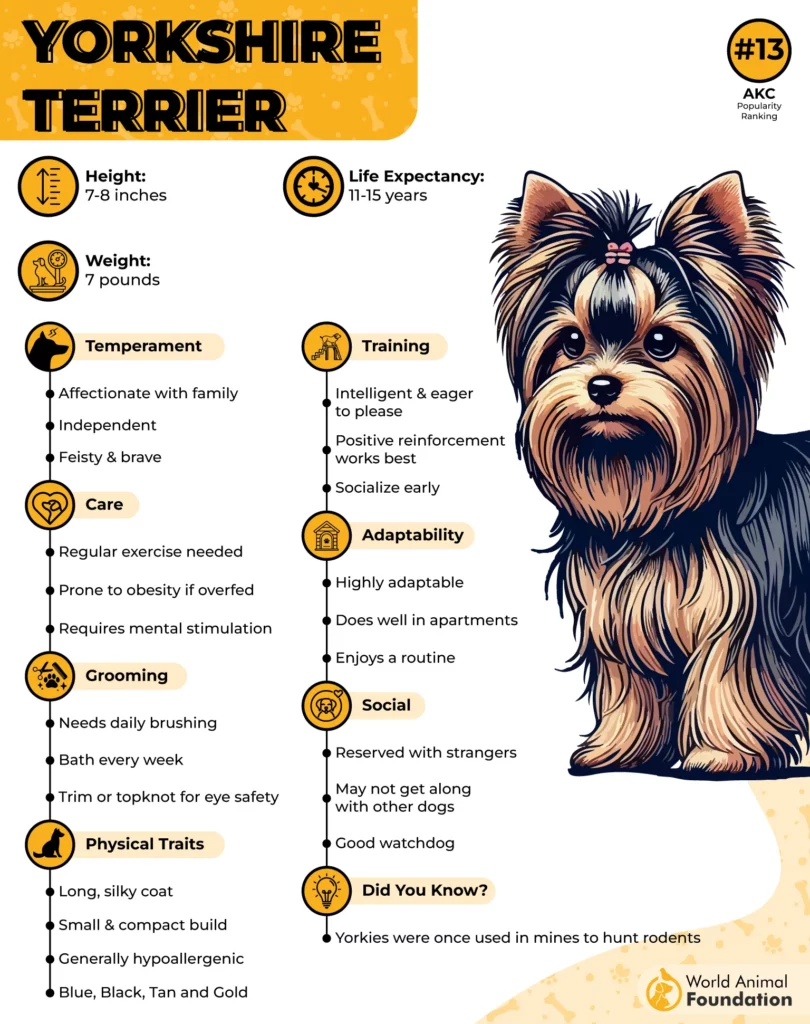
They’re especially good at picking up on their owner’s mood and responding with comfort, whether it’s curling up on your lap or simply sticking close during tough moments.
Yorkies do best when they’re not left alone for long periods. If they feel neglected, they may develop separation anxiety, showing signs like refusing to eat or acting out. However, with proper training and a nurturing environment, they become deeply devoted companions.
Their compact size also makes them ideal travel buddies, especially for people who need a support dog that can stay with them on the go.
Whether trained for specialized service or simply offering affection and company, a Yorkie’s loving personality and emotional awareness make them a good match for anyone seeking comfort and connection in a small, spirited package.
4. Pembroke Welsh Corgi
The Pembroke Welsh Corgi, famously adored by Queen Elizabeth II, is more than just a royal favorite—they’re intelligent, spirited, and full of personality. Originally bred for herding, these sturdy little dogs are still used on farms today, but they’re just as happy being part of a loving household. Corgis thrive when they’re included in family life and don’t enjoy being left out or kept in kennels.
Despite their short legs, Corgis are incredibly active and have sharp, curious minds. They love to stay busy and need regular exercise to stay healthy and happy.
Corgis shine in emotional support roles thanks to their affectionate, loyal nature and natural intuition. Their compact size makes them manageable in smaller homes or apartments, and their cheerful demeanor helps lift spirits.
Corgis are particularly comforting for people dealing with anxiety, depression, or loneliness, and can even be helpful for small children with autism. Their friendly energy and strong bond with their humans make them natural mood boosters.
Simply having a Corgi around can make a big difference in someone’s mental well-being. They offer the kind of constant companionship that helps ease stress and encourages daily routines like walks and outdoor time. With their sweet faces and lovable attitudes, Pembroke Welsh Corgis don’t just warm your heart—they make each day a little brighter.
5. Cavalier King Charles Spaniel
The Cavalier King Charles Spaniel is as sweet as they come—a gentle, affectionate companion that thrives on being close to the people they love. Originally adored by British royalty in the 17th century, these charming little dogs were bred to warm laps during chilly carriage rides and drafty castle days.
Even now, they carry that legacy of comfort and companionship, making them a top choice for those in need of emotional support.
Cavaliers have a heartwarming ability to form deep bonds with their humans. They’re small in size, easy to manage, and full of love—perfect for apartment living or anyone who might find larger breeds overwhelming.
What really sets them apart is how in tune they are with human emotions. Whether you’re feeling anxious, lonely, or just need a little extra love, a Cavalier seems to instinctively know how to help. They make one of the best emotional support dogs simply by being their empathetic, cuddly selves.
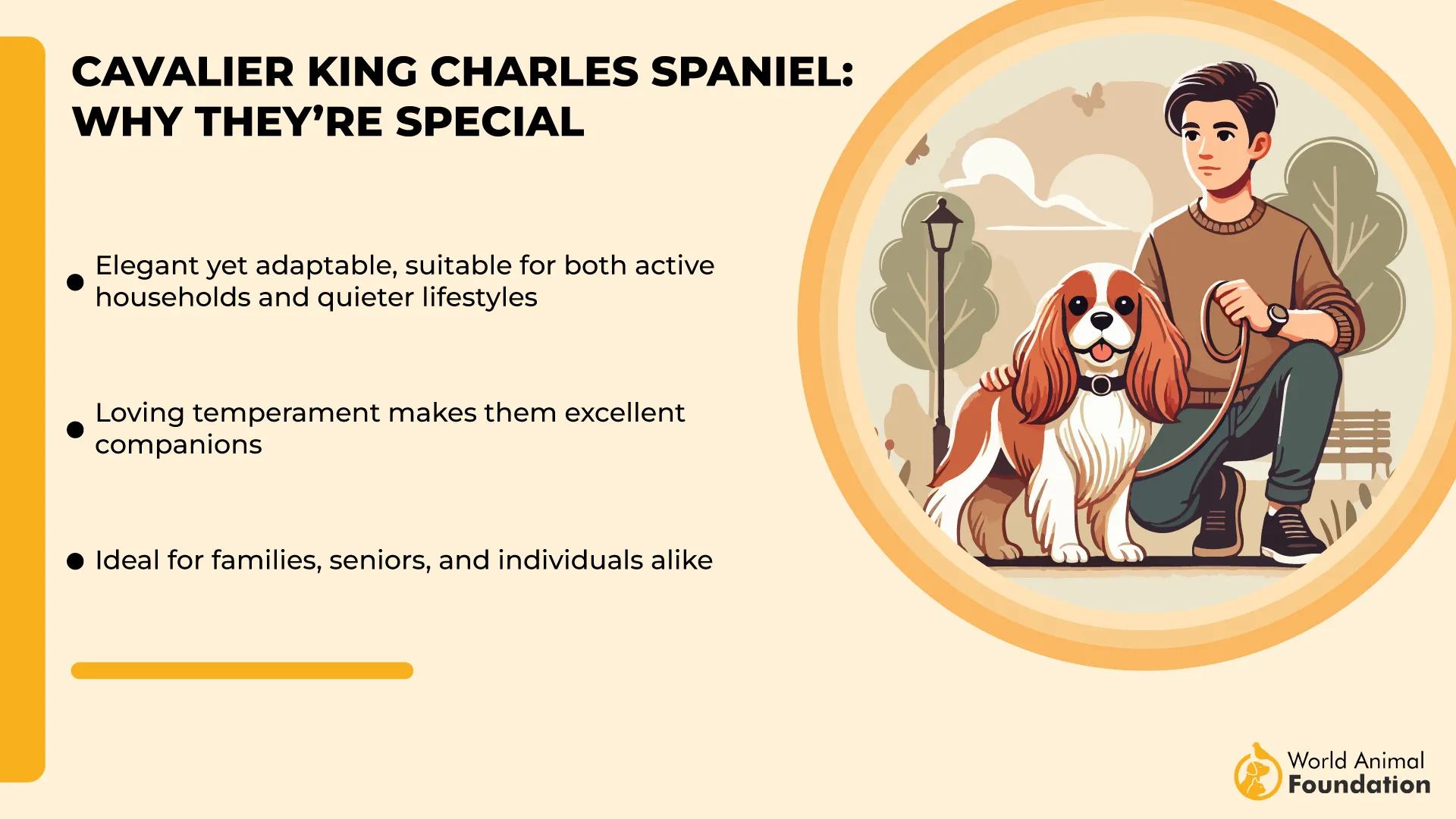
Thanks to their kind nature, Cavaliers are often used as therapy dogs in hospitals, nursing homes, and schools. They bring comfort wherever they go with their calm temperament and happy disposition.
They’re also highly intelligent and eager to please, making them easy to train for simple tasks or routines that support mental well-being. While they shouldn’t be let off-leash due to their natural instincts, they do just fine with daily walks and cozy time indoors.
6. German Shepherd
German Shepherds are one of those breeds that seem to have it all—intelligence, loyalty, courage, and a heart full of purpose. These large, athletic dogs were born to work and connect deeply with their people.
Originally bred for herding, these versatile dogs have become top choices for service work, police K9 units, and emotional support roles thanks to their sharp minds and strong protective instincts. When well-exercised and mentally stimulated, German Shepherds thrive in nearly any environment, from busy cities to quiet rural homes, according to PetMD.
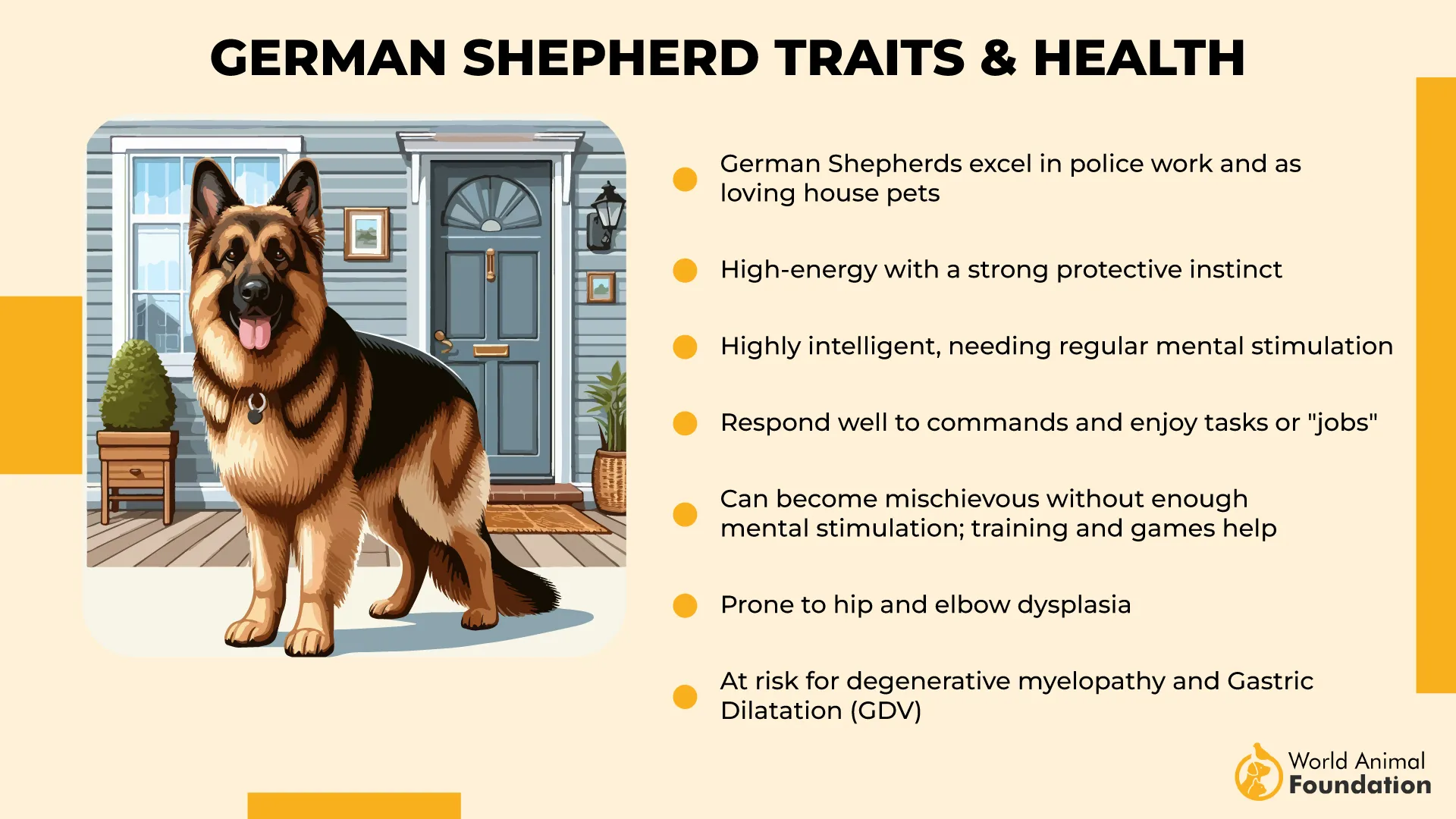
What really makes German Shepherds stand out is how trainable they are. Their eagerness to learn and dedication to their handlers mean they excel in roles that require complex tasks, such as guiding the visually impaired or assisting individuals with mobility challenges.
They can even be trained to detect changes in scent for medical alerts, like low blood sugar or oncoming seizures, thanks to their remarkable sense of smell. Add their unwavering loyalty to the mix, and it’s no surprise they’re often called the gold standard for service dog breeds.
For individuals needing emotional support, German Shepherds bring more than just skills—they bring presence. Their strong bond with their person, combined with a natural sense of empathy, makes them incredibly comforting companions for those dealing with anxiety, PTSD, or depression.
They’re patient, reliable, and deeply protective, offering both physical and emotional reassurance. While they need an active lifestyle and consistent training, the reward is a loyal best friend who’s always ready to support you, day or night, rain or shine.
7. Border Collie
Border Collies are the total package when it comes to brains, energy, and heart. Originally bred to herd sheep along the rugged borderlands of Scotland and England, these dogs still carry that same sharp focus and drive today.
With boundless energy and lightning-fast reflexes, they love a job to do—whether that’s running agility courses, playing fetch for hours, or simply sticking by your side with purpose in their eyes, states PetPlan.
What truly sets Border Collies apart is their exceptional intelligence. Considered by many to be the smartest breed in the world, they can learn commands quickly, follow complex cues, and even respond to subtle changes in body language.
That level of mental acuity makes them standout candidates for service work. From turning on lights and fetching medication to interrupting anxious behaviors or alerting to panic attacks, Border Collies can be trained to perform specific tasks with absolute precision and reliability.
Beyond their skills, Border Collies are incredibly loyal and emotionally attuned to their humans. They’re affectionate without being overly clingy, and their sensitivity makes them natural at picking up on shifts in mood or energy. For people with psychiatric or physical disabilities, that deep connection can be incredibly grounding.
Just know—they’re not couch potatoes. These dogs need daily mental and physical outlets to thrive, but if you can keep up, you’ll have a partner who’s as devoted as they are capable.
Conclusion
Choosing an emotional support dog can be a life-changing decision for those who need consistent companionship and energy to match their own. Specific dog breeds like Labrador Retrievers, Cocker Spaniels, and even the affectionate Bernese Mountain Dogs have proven to be some of the best dog breeds for offering comfort, especially to individuals managing ADHD symptoms or supporting autism children.
These energetic dogs not only provide constant stimulation and play but also share unconditional love and thrive on physical contact, making them ideal human companions.
Whether you’re drawn to gentle giants like the Great Pyrenees or lean toward active dogs suited for working or active individuals, the key is to find the best breed that aligns with your emotional and physical needs.
These service animals stand out for their loyalty, intelligence, and deep bond with their owners. A wagging tail, a nuzzle for attention, or the joy of sharing tasty treats—these dogs don’t just provide emotional support; they become the perfect companion through every moment of life’s highs and lows.


